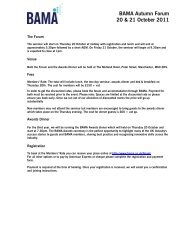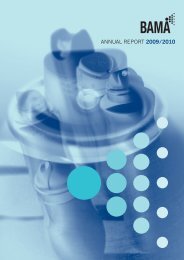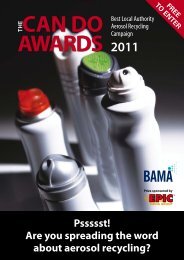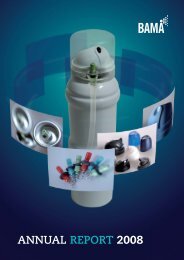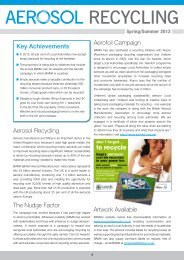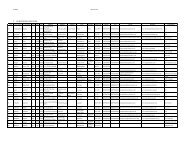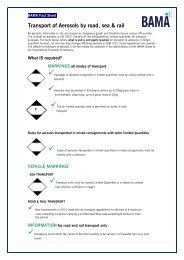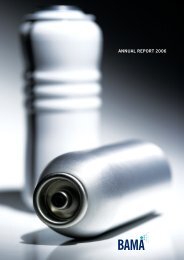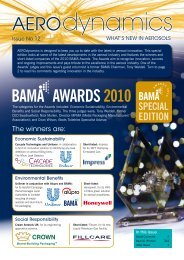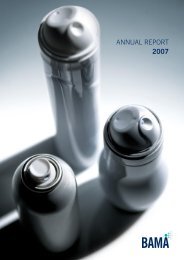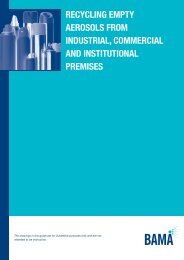You Should Be Recycling Your Aerosols - British Aerosol ...
You Should Be Recycling Your Aerosols - British Aerosol ...
You Should Be Recycling Your Aerosols - British Aerosol ...
Create successful ePaper yourself
Turn your PDF publications into a flip-book with our unique Google optimized e-Paper software.
EACH YEAR THE UK USES AROUND 600 MILLION AEROSOLS<br />
<strong>You</strong> <strong>Should</strong> be<br />
<strong>Recycling</strong> <strong>You</strong>r<br />
<strong><strong>Aerosol</strong>s</strong>
Each year, the UK uses around 600 million aerosols. On average<br />
that’s 10 cans per person, or 27 cans per household.<br />
<strong><strong>Aerosol</strong>s</strong> account for 4% of the metals packaging stream. We<br />
estimate that there are about 25,000 tonnes of tinplated steel<br />
and 4,500 tonnes of high grade aluminium available from<br />
recycling aerosols in the UK.<br />
<strong><strong>Aerosol</strong>s</strong> are recyclable – the numbers being recycled in the UK<br />
are lower than in other countries such as Germany, France and the<br />
US. Collecting empty aerosols along with other metal packaging will<br />
help your recycling targets.<br />
Markets exist for the materials recovered, which can add revenue to<br />
your recycling schemes (as valuable commodities in their own right)<br />
and avoid landfill costs and taxes:<br />
Steel <strong><strong>Aerosol</strong>s</strong> are accepted by many<br />
secondary metals dealers including CanRoute run by<br />
Corus Steel Packaging <strong>Recycling</strong>.<br />
Detinning recovers tin and high grade steel.<br />
Steel scrap is essential in new steel production<br />
Futher Information:<br />
www.corusgroup.com/en/responsibility or<br />
tel: 01554 712 632<br />
Aluminium <strong><strong>Aerosol</strong>s</strong> are now accepted by<br />
Novelis and many other secondary metals dealers.<br />
The aluminium used to make aerosols is 99.7% pure<br />
and so is of high value.<br />
Futher Information: www.alupro.org.uk or<br />
tel:01527 597 757
So how can you include aerosols in your<br />
recycling scheme<br />
The first thing to remember is that you shouldn’t create a special<br />
collection scheme. The best and safest way to recycle aerosols is to<br />
leave them mixed in with other metal waste – do not segregate or<br />
concentrate them.<br />
Educate consumers to put only EMPTY used aerosols in can banks<br />
and kerbside collection. Consumers must not pierce or squash the<br />
cans and if possible remove plastic parts that come off easily such<br />
as the caps.<br />
Ensure that you are taking the usual health and safety precautions for<br />
a well run Material Reclamation Facility especially ruling out sources<br />
of ignition.<br />
Local Authorities can view further information and download<br />
resources from the dedicated section of the BAMA website at<br />
www.recycleaerosols.co.uk<br />
Information on the BAMA website is split into Household,<br />
Non-household and Local Authorities sections. <strong>You</strong> can download<br />
newsletters and case studies about aerosol recycling undertaken by<br />
Local Authorities or request stickers for your Can Banks encouraging<br />
consumers to recycle their aerosols.<br />
For more detailed independent health and safety reports, and to obtain<br />
free can bank labels contact the <strong>British</strong> <strong>Aerosol</strong> Manufacturers’<br />
Association on:<br />
Tel: 020 7828 5111<br />
Fax: 020 7834 8436<br />
E-mail: enquiries@bama.co.uk<br />
www.bama.co.uk
No special steps are needed to recycle aerosols from the<br />
domestic waste stream but some sensible precautions should be<br />
followed:<br />
●<br />
●<br />
●<br />
●<br />
Leave aerosols mixed in with other metal waste – do not<br />
segregate and concentrate them.<br />
Advise consumers to put only empty used aerosols in can banks<br />
or kerbside collections.<br />
Many, many local authorities world-wide are successfully<br />
including aerosols in their recycling schemes. In a MRF, waste<br />
containing aerosols can be baled, flattened or shredded. As<br />
some of the residues may be flammable, it is wise to:<br />
● Maintain a Zone 2 area within 1m of the baler.<br />
● Maintain a 2.5m exclusion zone around the baler during<br />
operation.<br />
● Maintain Zone 2 around completed bales for 30 minutes.<br />
● Maintain adequate ventilation in the MRF.<br />
● Ensure there are no sparks, flames, naked lights or<br />
smoking.<br />
● Maintain a good standard of housekeeping, especially<br />
around and under the baler.<br />
● Use protective clothing and glasses and make sure that<br />
fire extinguishers are available.<br />
● Draw up a standard operating procedure and train your<br />
operators regularly.<br />
Although a flammable atmosphere could be generated in the<br />
baler or within the finished bales, tests show that this<br />
dissipates to safe levels very quickly in the surrounding air.<br />
More detailed guidance on the above is available from BAMA in our<br />
guide ‘<strong>Recycling</strong> Post-Consumer <strong><strong>Aerosol</strong>s</strong>’. This guide is free of<br />
charge, e-mail: enquiries@bama.co.uk or tel: 020 7828 5111 to<br />
request a copy.<br />
<strong>British</strong> <strong>Aerosol</strong> Manufacturers’ Association, Kings Buildings,<br />
Smith Square, London SW1P 3JJ<br />
Tel: 020 7828 5111<br />
Fax: 020 7834 8436<br />
e-mail: enquiries@bama.co.uk<br />
www.bama.co.uk




